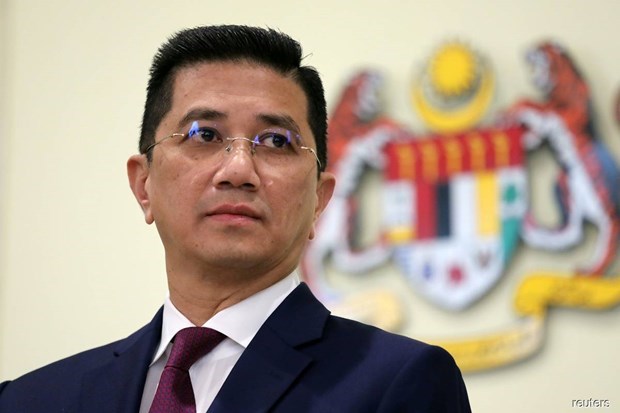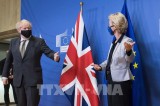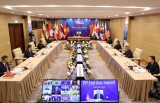RCEP a proof of signatories’ resolve to strengthen integration: Malaysian minister
The recently concluded Comprehensive Regional Economic Partnership (RCEP) agreement is a proof of resolve of Malaysia, together with ASEAN member countries and the five ASEAN Free-Trade Agreement (FTA) partners, to continue strengthening regional economic integration, facilitating cross-border trade and investment, and reducing non-tariff barriers, a Malaysian minister has said.

Malaysian Senior Minister for Economy and Minister of International Trade and Industry Mohamed Azmin Ali
Malaysian Senior Minister for Economy and Minister of International Trade and Industry Azmin Ali said the RCEP agreement was the largest FTA covering 2.2 billion or nearly one-third (29.7 percent) of the world’s population and contributed 24.8 trillion USD or 28.9 percent of the world’s gross domestic product (GDP) based on the World Bank’s data in 2018.
The RCEP can accelerate the process of the regional economic recovery post COVID-19, as well as that of Malaysia, through market opening, increased investment, trade facilitation and industrial integration, especially for small and medium enterprises (SMEs) into the regional value chain, he said.
Despite all the challenges and uncertainties of the global economy triggered by the spread of the ongoing pandemic, Azmin said all the Malaysian government’s efforts and careful planning to rebuild the country’s economy have paid off.
The RCEP trade pact was formally signed in November 2020 within the framework of the recent 37th ASEAN Summit and Related Summits hosted by Vietnam, after years of negotiation.
It includes 10 ASEAN members, namely Brunei, Cambodia, Indonesia, Laos, Malaysia, Myanmar, the Philippines, Singapore, Thailand and Vietnam, and the bloc's five FTA partners of China, Japan, the RoK, Australia and New Zealand./.
VNA
 Malaysia's digital economy projected to reach 31 billion USD in 2024
Malaysia's digital economy projected to reach 31 billion USD in 2024
 Opportunity to enhance the position of the Global South
Opportunity to enhance the position of the Global South
 Thailand to build new bridge to Cambodia
Thailand to build new bridge to Cambodia
 Bulgaria charts new course with Vietnam on President’s upcoming visit: Diplomat
Bulgaria charts new course with Vietnam on President’s upcoming visit: Diplomat
 Seminar seeks ways to boost ASEAN - Latin America connectivity
Seminar seeks ways to boost ASEAN - Latin America connectivity
 Indonesia seeks India's help in health education
Indonesia seeks India's help in health education
 Indonesia named world's most generous country in 2024
Indonesia named world's most generous country in 2024
 Philippines: Over-4m-high floodwaters make thousands of houses submerged
Philippines: Over-4m-high floodwaters make thousands of houses submerged
 Singapore’s public sector records carbon reduction in 2023
Singapore’s public sector records carbon reduction in 2023
 Pressure facing the EU on its growth track
Pressure facing the EU on its growth track



